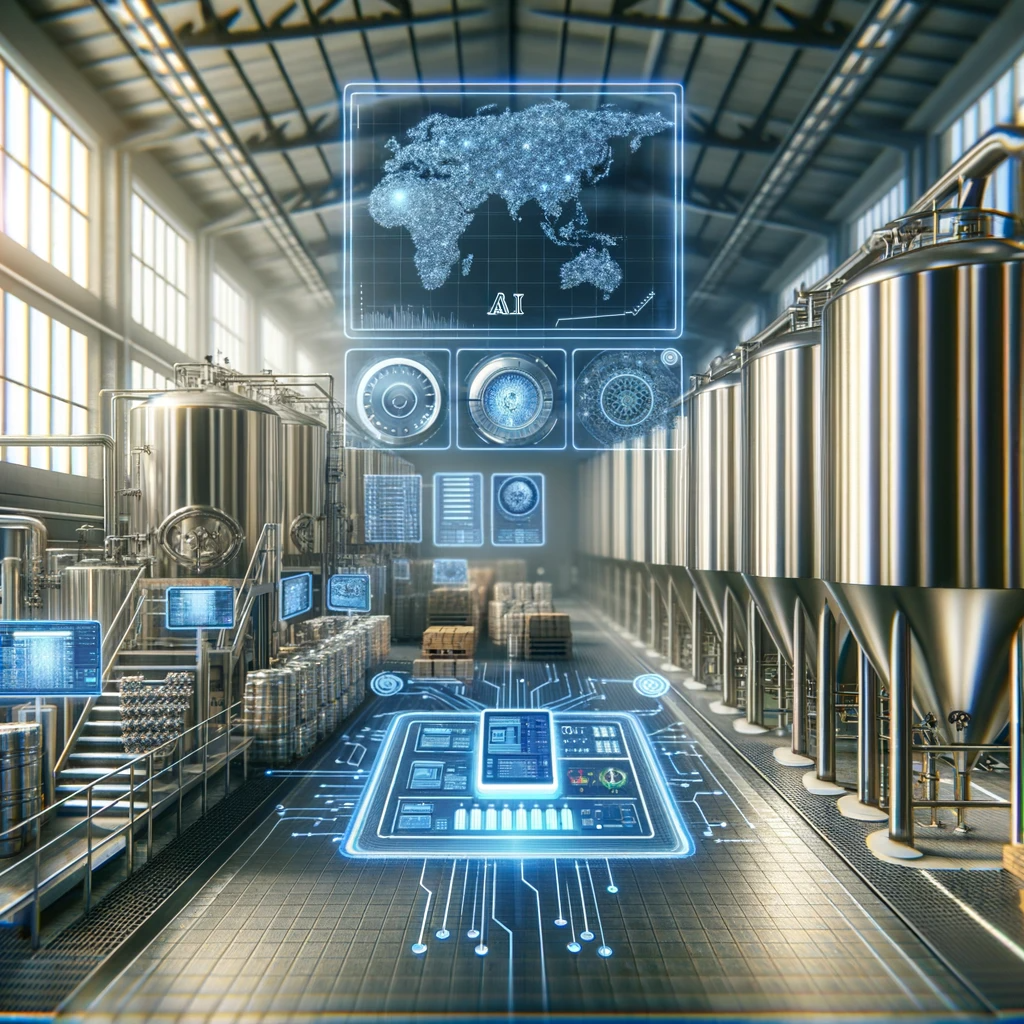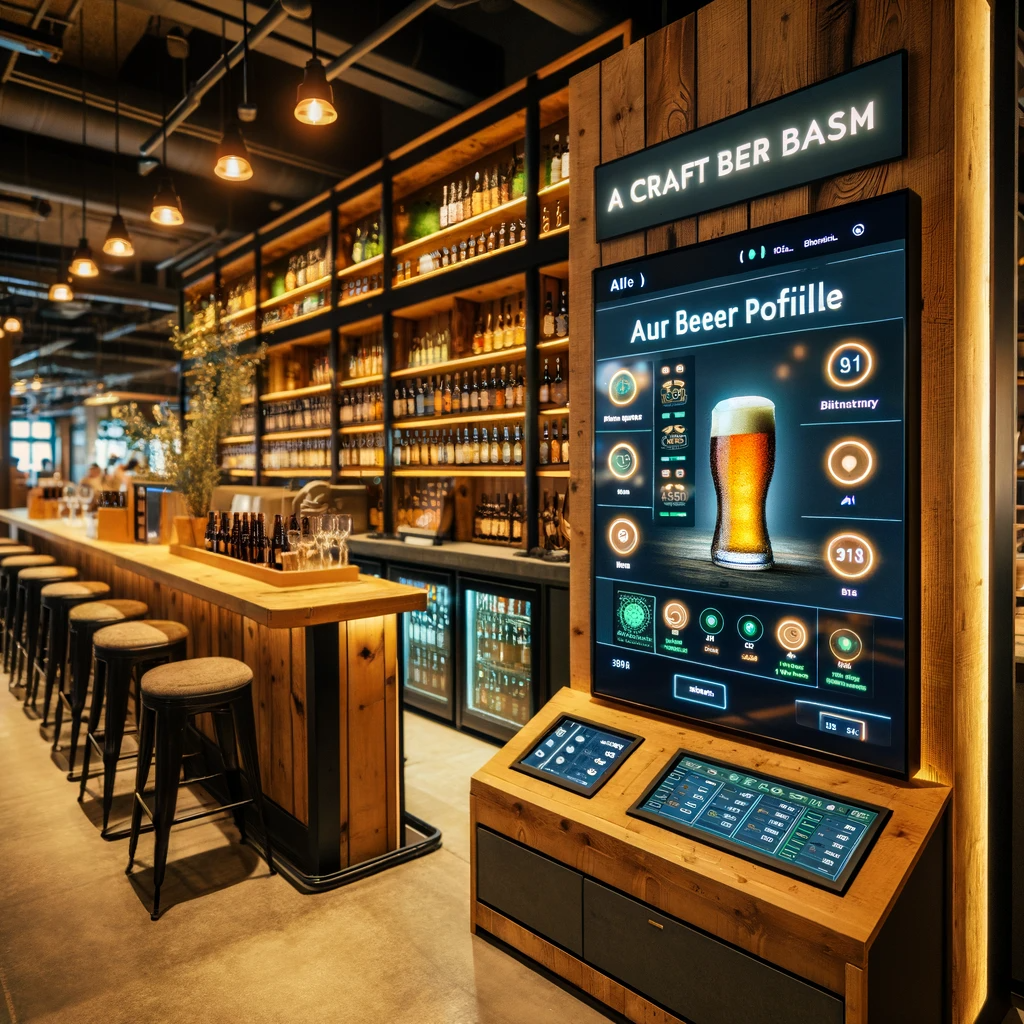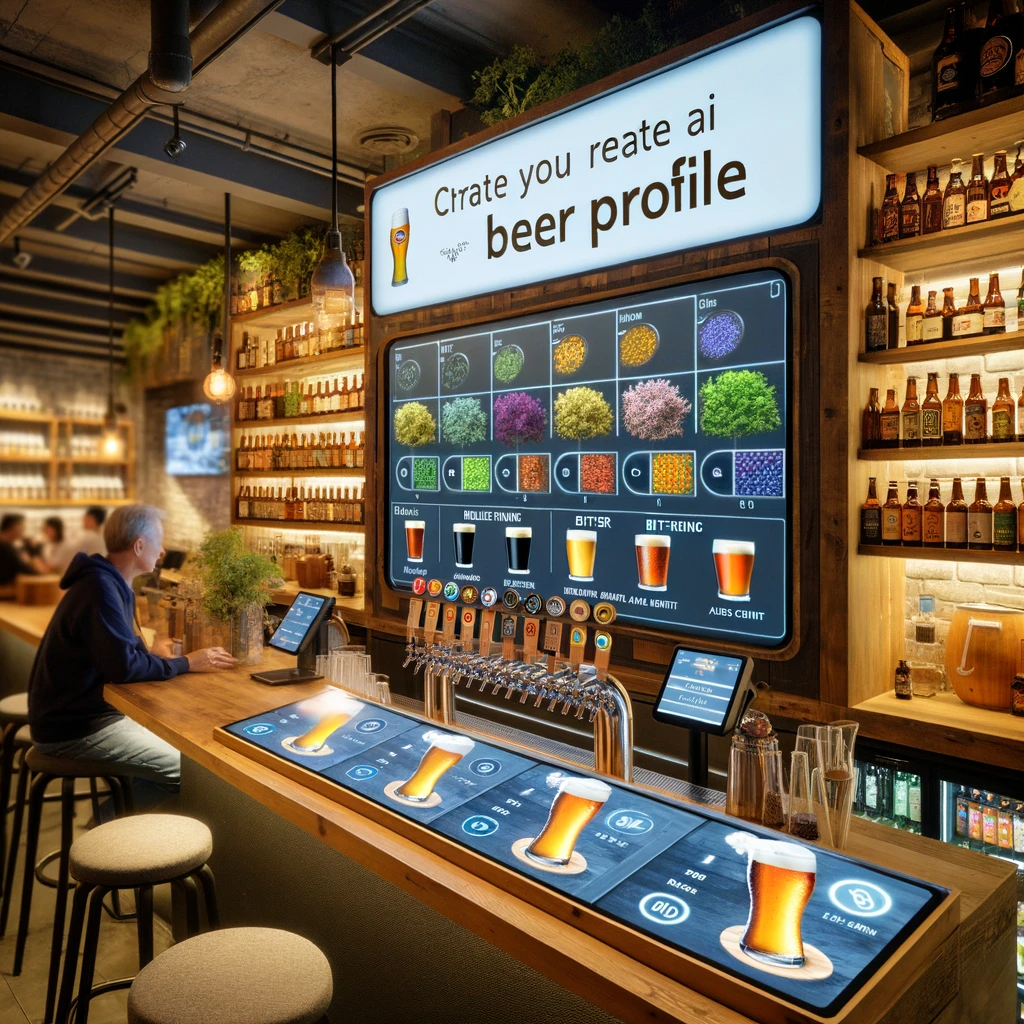The craft beer industry has witnessed a renaissance in recent years, with small, independent breweries flourishing and beer enthusiasts embracing a diverse range of flavors and styles. What was once a niche market has now become a dynamic and thriving sector of the brewing industry. Central to the appeal of craft beer is its innovation, diversity, and the ability to cater to unique tastes.
Brewing, as an art and science, involves a delicate interplay of ingredients, techniques, and creativity. Brewers strive for consistency in taste, aroma, and quality, yet each batch of beer retains its distinctive character. This balance between art and science is at the core of craft brewing.
However, as craft breweries expand and consumer demands diversify, the challenge of maintaining consistency while offering unique brews becomes more complex. This is where technology, particularly Artificial Intelligence (AI), is making its mark. AI is revolutionizing the craft beer industry by providing brewers with powerful tools for flavor profiling, quality control, and even the creation of customized beer recipes.
In this exploration of the craft beer landscape, we delve into how AI is reshaping the industry. We will examine how AI-powered systems analyze chemical compositions and sensory data to create flavor profiles that ensure consistency. We will also delve into the realm of quality control, where AI monitors brewing processes in real-time to maintain high standards. Moreover, we will explore the intriguing world of AI-generated beer recipes, pushing the boundaries of creativity in craft brewing.
As we venture further into the intersection of AI and craft beer, we discover not only technological advancements but also the careful balance between innovation and the preservation of the craft. This journey into the realm of craft beer and AI reveals a future where personalized brews and quality assurance coexist with the passion and artistry of brewing, offering enthusiasts an exciting and diverse beer-drinking experience.
The Craft Beer Renaissance
In recent decades, the craft beer industry has undergone a remarkable renaissance, reshaping the landscape of brewing worldwide. What was once dominated by a few major brewing conglomerates has given way to a vibrant ecosystem of small, independent breweries, affectionately known as “craft” breweries. This resurgence of craft brewing has introduced a new era of experimentation, flavor diversity, and consumer enthusiasm.
The roots of this movement can be traced back to the late 20th century when a handful of passionate brewers decided to challenge the status quo of mass-produced, homogeneous beer. They envisioned a return to traditional brewing methods, emphasizing quality, flavor, and creativity. These pioneers laid the foundation for the craft beer revolution.
Today, microbreweries and craft breweries have proliferated, offering an extensive array of beer styles, flavors, and profiles. From hoppy IPAs to complex stouts and sours, craft breweries have become hubs of innovation and taste exploration. This diversity caters to the evolving preferences of beer enthusiasts who seek unique and authentic brews.
The Art and Science of Brewing
At its core, brewing is a delicate blend of artistry and science. The process involves transforming a handful of simple ingredients—water, malted grains, hops, and yeast—into a beverage that boasts a staggering range of flavors and characteristics. While the fundamental principles of brewing remain constant, each batch of beer can emerge with its own distinct personality.
Brewers carefully manipulate variables such as ingredients, fermentation temperature, yeast strains, and aging to craft a beer that aligns with their vision. It’s a dynamic and creative process where the smallest deviations can lead to dramatically different outcomes. The art of brewing lies in the brewer’s ability to balance these variables to achieve the desired flavor and quality.
Yet, brewing is not solely an artistic pursuit; it is deeply rooted in science. Factors like water chemistry, pH levels, and temperature control play crucial roles in determining a beer’s profile. The mastery of these scientific aspects enables brewers to replicate their recipes with consistency and precision.

Introduction to Artificial Intelligence (AI)
Before we delve into the impact of AI on craft brewing, it’s essential to understand what Artificial Intelligence is and how it functions. AI is a multidisciplinary field of computer science that focuses on creating systems capable of performing tasks that typically require human intelligence. These tasks include problem-solving, pattern recognition, decision-making, and even natural language understanding.
Machine Learning (ML), a subset of AI, involves training algorithms to learn from data and make predictions or decisions based on that learning. Deep Learning, a subfield of ML, utilizes artificial neural networks to model and solve complex problems. Natural Language Processing (NLP) enables computers to understand and generate human language, while Computer Vision enables machines to interpret and process visual information from the world.
AI systems excel at analyzing vast datasets and identifying patterns that might elude human observers. This ability to process and make sense of large volumes of data positions AI as a powerful tool for optimization, automation, and decision-making.
Flavor Profiling with AI
One of the most critical aspects of brewing is achieving consistent flavor profiles in each batch of beer. Craft breweries often aim to replicate the same taste, aroma, and characteristics that have made their beers popular among consumers. This level of consistency is challenging to maintain due to the inherent variability in brewing ingredients and processes.
This is where AI steps in. AI-powered systems can analyze chemical compositions and sensory data from batches of beer, helping brewers create detailed flavor profiles. By examining key components such as hop varieties, malt types, and yeast strains, AI can provide insights into the factors contributing to a beer’s flavor.
AI’s analysis goes beyond what the human palate can discern. It can identify subtle variations, trace chemical compounds, and provide recommendations for maintaining consistency. For craft breweries, this means producing beer with the same signature taste every time, enhancing brand loyalty and consumer satisfaction.
Quality Control and Brewing Precision
Consistency and quality control are paramount in brewing, but they can be challenging to achieve consistently. Variations in temperature, fermentation times, ingredient quality, and other factors can lead to unexpected deviations in the final product. Ensuring that each batch meets high-quality standards is a relentless pursuit for brewers.
AI comes to the rescue by providing real-time monitoring and control of the brewing process. Sensors and data collection devices integrated into brewing equipment can feed data to AI systems that analyze it for deviations from desired parameters. If a deviation is detected, AI can trigger automated adjustments to bring the process back into alignment.
This real-time monitoring not only reduces the likelihood of defects or off-flavors but also allows brewers to optimize the brewing process for efficiency and quality. The result is a more consistent and high-quality product that meets consumer expectations.
Crafting Unique Beer Recipes
While consistency is crucial, craft brewers also thrive on innovation and creativity. They continuously experiment with ingredients, techniques, and styles to push the boundaries of beer flavor and variety. AI plays a fascinating role in this aspect by assisting brewers in crafting unique and innovative beer recipes.
AI algorithms can analyze consumer preferences, market trends, and ingredient availability to generate beer recipes that align with current demands. These AI-generated recipes can explore combinations of ingredients that brewers might not have considered, leading to exciting and unexpected flavor profiles.
Brewers can also use AI to simulate the outcome of different recipes before brewing a batch, allowing them to experiment in a virtual space and reduce the risk of undesirable results. This level of creativity and experimentation, combined with AI’s precision, opens doors to novel and compelling beer offerings.
Ethical Considerations and Brewer Expertise
As AI becomes more integrated into craft brewing, ethical considerations arise. Ensuring data privacy and security is paramount, as AI systems rely on sensitive information related to recipes, processes, and customer preferences. Breweries must implement robust cybersecurity measures to protect their intellectual property and confidential data.
Another ethical consideration is the balance between AI innovation and the expertise of brewers. While AI can provide valuable insights and automation, the essence of craft brewing lies in the craftsmanship of brewers. The human touch, intuition, and passion for the craft are irreplaceable elements that contribute to the uniqueness of each brew.
Striking a balance between AI-driven enhancements and preserving the authenticity of craft brewing is essential. AI should complement and empower brewers rather than replace them. It should serve as a tool to optimize processes, create innovative recipes, and ensure consistency, allowing brewers to focus on their artistic expression and the artistry of their craft.
The Future of Craft Beer with AI
The future of craft beer is an exciting frontier where AI and brewing expertise collaborate to create unparalleled beer experiences. AI’s role in craft brewing is expected to expand, with more breweries adopting AI-driven technologies to enhance quality, innovation, and consistency.
Predictive analytics and machine learning models will continue to refine flavor profiling, ensuring that every batch tastes as intended. Quality control will become more automated and precise, reducing the risk of flaws or variations. AI-generated beer recipes will offer consumers an ever-expanding array of unique and intriguing flavors.
Furthermore, AI can enable personalized brewing experiences, allowing consumers to customize their beers based on their preferences. Breweries may offer AI-powered platforms for consumers to create bespoke beer recipes, providing a level of personalization and engagement never seen before.
However, as the craft beer industry embraces AI, ethical considerations will remain critical. Protecting sensitive data and maintaining the integrity of the craft must be at the forefront of brewery operations.
In summary, the intersection of AI and craft brewing promises a future where quality, consistency, innovation, and personalization coexist harmoniously. It is a future where technology enhances the artistry of brewing, offering enthusiasts an ever-evolving and diverse beer-drinking experience. AI is not just reshaping the craft beer industry; it is elevating it to new heights, ensuring that the craft continues to thrive in the digital age.

Conclusion
In the world of craft brewing, where creativity, passion, and innovation are the driving forces, Artificial Intelligence (AI) has emerged as a powerful tool that is reshaping the industry. As we conclude our journey through the intersection of AI and craft beer, it becomes clear that this partnership is revolutionizing how beer is brewed, enjoyed, and personalized.
The craft beer renaissance has brought forth an era of diversity and experimentation, where small breweries aim to craft distinctive flavors and maintain consistency. The balance between artistry and science has always defined brewing, and AI is helping brewers strike that balance with finesse.
Flavor profiling with AI ensures that each batch of beer embodies the intended taste and aroma, enhancing the quality of the product and satisfying customer expectations. AI-driven quality control provides real-time monitoring, reducing defects and optimizing the brewing process for efficiency and excellence.
Yet, perhaps one of the most exciting aspects of AI in craft brewing is its capacity to inspire creativity. AI-generated beer recipes offer brewers the opportunity to explore uncharted territory, experiment with ingredients, and cater to evolving consumer preferences. It’s a fusion of tradition and innovation that promises a dynamic future for craft beer.
Ethical considerations guide this journey, reminding us of the importance of data security, intellectual property protection, and the irreplaceable role of human expertise in brewing. The craft beer industry remains a testament to the passion and craftsmanship of brewers, and AI complements their skills rather than replaces them.
Looking ahead, the future of craft beer with AI is filled with promise. Predictive analytics and machine learning will continue to refine flavor profiles and ensure consistency. Personalization will become a hallmark, with consumers having the opportunity to create their own unique brews using AI-powered platforms.
In this digital age, the craft beer industry is not just embracing technology; it is elevating its craft to new heights. The partnership between AI and craft brewing is redefining what is possible in the world of beer, offering enthusiasts an ever-evolving and diverse beer-drinking experience.
As we raise our glasses to the future of craft beer, let us toast to the fusion of tradition and innovation, the synergy of art and science, and the ongoing journey of crafting unique, exceptional brews that continue to capture our imaginations and delight our palates. AI is not just reshaping the craft beer industry; it is helping it evolve, ensuring that the craft remains vibrant and exciting for generations to come. Cheers to the future of craft beer and the possibilities AI brings to the pint glass!
